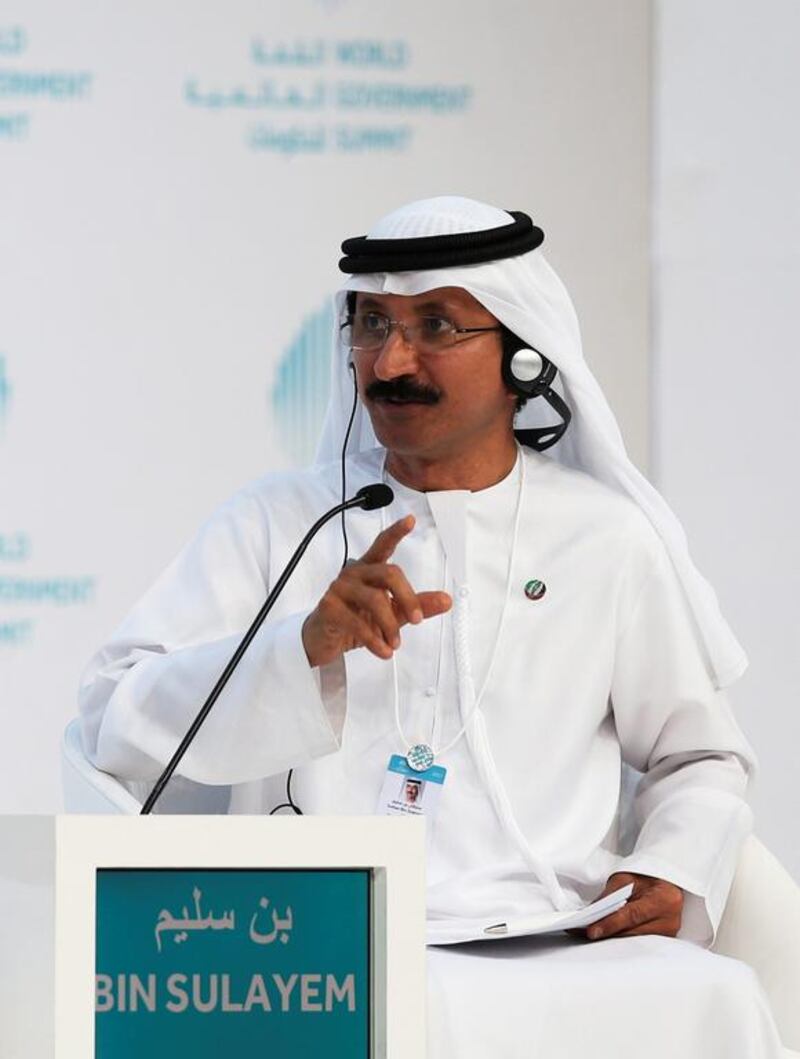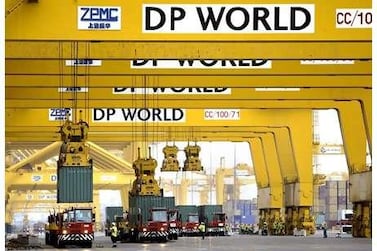DP World, the global ports operator, has hit out at the damaging uncertainty of the prolonged British wrangling over the country's exit from the European Union.
Sultan Ahmed bin Sulayem, the Dubai-based company's chairman, met Liam Fox, the UK's international trade minister, at the World Government Summit in Dubai this week, where he said DP World's two modern ports on the English coastline were willing to offset any disruption after the March 29 deadline to quit the EU.
Addressing the WGS on Tuesday, Mr bin Sulayem said that the failure so far to strike a Brexit deal was frustrating for businesses.
"Our problem is the indecisiveness of the government," he said.
"We don't care as businessmen whether they have Brexit, or Brexit with an agreement, or Brexit with a good agreement, or Brexit with a bad agreement. Once they decide, as businessmen, we are capable of running our business once all this basically indecisive environment disappears."
After the briefing with Mr Fox, Mr bin Sulayem said the operator's two terminals in the UK, at the deep-sea ports of Essex-based London Gateway and Southampton on the south coast, were well-placed to cope with Brexit disruption.
The possibility of a no-deal Brexit – with the introduction of new customs and regulatory checks – has triggered concerns over blockages at the Port of Dover, which handles more freight with continental Europe that its rivals
"We confirmed our ability to react immediately; there will not be any congestion," a Dubai official told the Financial Times at the summit.
Theresa May, the British prime minister, warned of more delays on Tuesday as she told Parliament that efforts to resolve differences with Brussels over the border between Northern Ireland and the Republic of Ireland had yielded no agreement.
With just 45 days left, Mrs May is struggling to convince the rest of the EU to give Britain further concessions that would overcome opposition in Parliament to the Withdrawal Agreement reached late last year.
As the official trade partner for the summit, we are delighted to be attending @worldgovsummit. Our Chairman and CEO Sultan Ahmed Bin Sulayem @ssulayem held a series of conversations on day one with dignataries and attending media. #worldgovsummit pic.twitter.com/mZngMt8YjS
— DP World (@DP_World) February 10, 2019
Spare capacity at London Gateway, DP World's deep-sea port at the mouth of the River Thames, could be used to deal with Brexit bottlenecks, senior executives told The National.
London Gateway, which opened in 2013, benefits from a modern, semi-automated port that cut inefficiencies and increased the turnaround of shipping containers.
Although any Brexit uncertainty is never helpful for business, with 86 per cent of traffic coming from outside the EU, the port is well placed to ride out any short-term issues, according to James Leeson, DP World’s head of commercial at its UK ports.
“If you look at many of these goods, they are already coming in from outside the EU. Fundamentally speaking, what’s the problem?” he said. “You can envisage the government will need things like pharmaceuticals, baby food. We’ve got the capacity to soak up the demand. If there’s a demand, we can do it at short notice.”
Mr Leeson said the port mainly handled activity from South America and between the east and west hemispheres.
"We’ve already got the infrastructure and IT resources to handle business. We can do that for other trades if that’s required post end of March."
In 2018 London Gateway’s three berths dealt with just over 1.3 million twenty foot containers – or TEUs – but has the capacity to work with 2.4 million should there be a sharp spike.
Its 12 quay cranes are among the largest in the business, as tall as the London Eye when their boom is up.
Business leaders fear a major hold-up if a so-called hard Brexit occurs.
An advanced customs system also means goods can move through comparatively quickly.
An adjoining logistics park, the largest in Europe, is just 20 per cent occupied and could also be used for stockpiling if necessary. The small distance between the port and park was described as highly desired by companies for its fast transfer.
The port's location gives it access to the undersea Channel Tunnel freight rail service. At 48 kilometres from central London, there is also easy access across the densely populated region.
Volumes have already been rising sharply even as Brexit looms – throughput grew by 35 per cent in 2017, in stark contrast to competitors. The British economy grew by just 1.4 per cent last year with economists blaming uncertainty for a sharp slowdown in the final quarter.
Very nice to catch up @BrunoLeMaire my French counterpart at the @WorldGovSummit yesterday in UAE. A good discussion on a whole range of Trade related issues. #WorldGovSummit #WorldGovernmentSummit2019 @tradegovuk pic.twitter.com/WfobATQU9i
— Dr Liam Fox MP (@LiamFox) February 11, 2019






